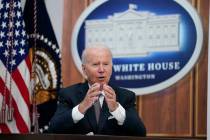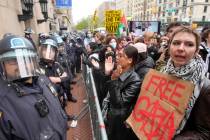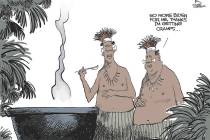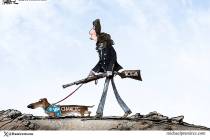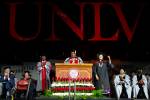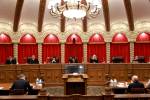Freedom for speech we hate
There have been a few incidents recently that reveal just how tenuously we as a people grasp the concept of free speech.
There was the youngster at Spring Valley High School who was sent to the dean's office for refusing to stand during the Pledge of Allegiance. There was the woman who was jailed by a Clark County judge for contempt of court for picketing a local jeweler. Then there were those goofy guys from Westboro Baptist Church in Topeka, Kan., who announced they would stage a protest in Salt Lake City during the funeral of the president of the Church of Jesus Christ of Latter-day Saints.
Gut-level reactions were roused.
"Sometimes I wish there was no First Amendment," wrote a reader of the Deseret Morning News in the comment section below a story about the Westboro plan -- an especially puzzling comment since one of the five rights outlined by the First Amendment is that of religion. A number of other subsequent comments so noted.
A letter writer said of the story about the student refusing to stand for the pledge, "If you can't respect the flag by standing, are you relinquishing all of your other freedoms? It's nice to pick and choose, maybe the United States should pick and choose what freedoms you are entitled to receive in this country. Sounds fair to me."
This brings to mind the title of Pulitzer Prize-winning columnist Anthony Lewis' latest book: "Freedom for the Thought That We Hate."
The title is taken from a U.S. Supreme Court opinion written in 1929 by Justice Oliver Wendell Holmes in the case of a Quaker from Hungary who applied to become a U.S. citizen, but was rejected because she refused to swear to personally take up arms in defense of the country.
Justice Holmes wrote, "(I)f there is any principle of the Constitution that more imperatively calls for attachment than any other it is the principle of free thought -- not free thought for those who agree with us but freedom for the thought that we hate."
Lewis' book explores how this country has dealt with those thoughts we hate -- from the Sedition Act of 1789 that made it a crime to publish "any false, scandalous and malicious writing or writings against the government of the United States," which Thomas Jefferson and James Madison had to battle anonymously lest they be jailed as 14 others were, to current attempts to outlaw "hate speech" and the rantings of Islamic jihadists.
Even Lewis is willing to draw a line:
The law of the American Constitution allows suppression only when violence or violation of law are intended by speakers and are likely to take place imminently. But perhaps judges, and the rest of us, will be more on guard now for the rare act of expression -- not the burning of a flag or the racist slang of an undergraduate -- that is genuinely dangerous. I think we should be able to punish speech that urges terrorist violence to an audience some of whose members are ready to act on the urging. That is imminence enough."
To me it is not the thought or speech that should be punished under the auspices of law, but the deed, no matter what its motivation.
Such thoughts and speech should be vigorously challenged by freedom-loving people and defeated in the marketplace of ideas. And, yes, authorities should watch closely those who might actually act on what is being preached.
The principle lies not in the ink on parchment in the National Archives, but with the people, as Judge Learned Hand stated in a speech in 1944 while the nation was at war:
"I often wonder whether we do not rest our hopes too much upon constitutions, upon laws and upon courts. These are false hopes; believe me, these are false hopes. Liberty lies in the hearts of men and women; when it dies there, no constitution, no law, no court can even do much to help it."
That part is often quoted, but few recall the concluding words, "(I)n the spirit of that America for which our young men are at this moment fighting and dying; in that spirit of liberty and of America I ask you to rise and with me pledge our faith in the glorious destiny of our beloved country."
He asked. He did not order.
Thomas Mitchell is editor of the Review-Journal and writes about the role of a free press and free speech. He was be contacted at 383-0261 or via e-mail at tmitchell@reviewjournal.com.








